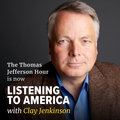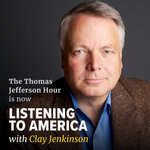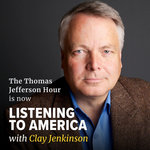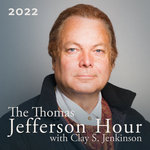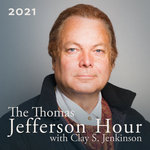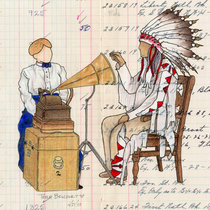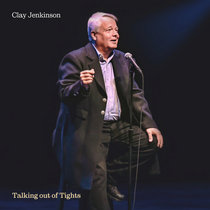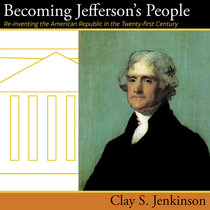
Edmond-Charles Genêt
from What Would Thomas Jefferson Do? (2018) by Listening to America with Clay Jenkinson
1776 Club exclusive
-
1776 Club
Join now to receive all the new shows Listening to America with Clay Jenkinson creates, including 19 back-catalog releases, delivered instantly to you via the Bandcamp app for iOS and Android. You’ll also get access to supporter-only exclusives like this track. Learn more.Join Now $5 USD/month or more
about
The following is a rush transcript.
DS: 00:00 Good day, citizens, and welcome to What Would Jefferson Do?, our weekly opportunity to discuss current American events with President Thomas Jefferson, who's seated across from me now. Good day to you, Mr Jefferson.
CSJ as TJ: 00:15 Good day to you, citizen.
DS: 00:17 Mr Jefferson, I wanted to speak to you about foreign nationals who may have committed crimes against the United States. There was an incident right now involving such a situation situation
DS: 00:29 and I'm wondering if there was any time during your time as president of something like that occurred.
CSJ as TJ: 00:36 Not during my time as president, but I do remember that during the French revolution, the French sent an envoy to the United States by the name of Edmond Genet and Genet thought that the American people were 100 percent behind the French revolution and that we would side with the French who had been our ally during the war, essentially no matter what, and he landed in South Carolina where he was given a hero's welcome and he made his way almost like a foreign prince up to Philadelphia to meet President Washington and he made a nuisance of himself and he actually then violated American law. He was fitting out privateers in American ports. A privateer is a vessel which is commercial in nature, private in nature, which is then turned into a war machine, a war vessel by a country or by an administration, and he was a fitting out privateers in American waters, which was a direct violation of the neutrality proclamation that George Washington had made.
CSJ as TJ: 01:48 At one point, he actually urged the American people to either go over the head of George Washington to insist on a pro French policy during this war or to commit revolution in the streets to show its distaste for the neutrality that the Washington administration was showing. So in the end, I, as secretary of state had to make a formal complaint to the French directory and I had to insist that they recall citizen Genet because he had in fact violated a question of fundamental sovereignty. We couldn't allow a French national to be here stirring up anti administration feeling in this country or fitting out privateers in our waters.
DS: 02:31 Were there any guidelines? Are there any guidelines provided for in government on how to handle situations like this?
CSJ as TJ: 02:38 Well, this is very difficult because first of all, I had my own views and they are anti British, pro French and I am a sincere believer in the validity of the French revolution.
CSJ as TJ: 02:51 I continued all of my life to hope that it would end in the establishment of a free and well-governed constitutional republic and I never a friend to Great Britain and it seemed to me that we were continuously being humiliated by our former colonial masters.
DS: 03:07 But what rights does our nation have to protect itself?
CSJ as TJ: 03:11 Well we have our own sovereignty and the president is the commander in chief and he is required by the constitution to maintain public welfare and public order. When the war began, Washington had issued unilaterally a proclamation of American neutrality, which I was opposed to, but nevertheless, that's what Washington did and at that point by executive order, he has said, we will not permit any Americans to side with one nation over the other in this quarrel. And suddenly here comes this citizen Genet filled with revolutionary fervor and youth who's trying to stir America into going over the head of our sitting president.
CSJ as TJ: 03:54 There's no international law to govern this. There's just the law of national sovereignty and good sense.
DS: 03:59 But you, you must have some feelings about the United States being able to protect itself from foreign entities.
CSJ as TJ: 04:06 Of course, the reason for a national government, in my opinion, virtually the only reason for a national government is to protect the sovereignty and the lives of American citizens at home particularly, but also our citizens who might find themselves in Prague or Paris or Madrid or on the high seas. This is the thing that a country does and if foreign nationals are violating American laws, in this case, trademark laws or patent laws,
CSJ as TJ: 04:31 the United States has a right to try to bring them to heel, to bring them to justice, but that doesn't require even our allies to cooperate with us in extradition. Extradition is a very complex international problem, which has never been really codified so that all nations know where they stand in situations of this sort.
DS: 04:53 Thank you very much, Mr Jefferson.
CSJ as TJ: 04:55 You're most welcome, sir.
DS: 00:00 Good day, citizens, and welcome to What Would Jefferson Do?, our weekly opportunity to discuss current American events with President Thomas Jefferson, who's seated across from me now. Good day to you, Mr Jefferson.
CSJ as TJ: 00:15 Good day to you, citizen.
DS: 00:17 Mr Jefferson, I wanted to speak to you about foreign nationals who may have committed crimes against the United States. There was an incident right now involving such a situation situation
DS: 00:29 and I'm wondering if there was any time during your time as president of something like that occurred.
CSJ as TJ: 00:36 Not during my time as president, but I do remember that during the French revolution, the French sent an envoy to the United States by the name of Edmond Genet and Genet thought that the American people were 100 percent behind the French revolution and that we would side with the French who had been our ally during the war, essentially no matter what, and he landed in South Carolina where he was given a hero's welcome and he made his way almost like a foreign prince up to Philadelphia to meet President Washington and he made a nuisance of himself and he actually then violated American law. He was fitting out privateers in American ports. A privateer is a vessel which is commercial in nature, private in nature, which is then turned into a war machine, a war vessel by a country or by an administration, and he was a fitting out privateers in American waters, which was a direct violation of the neutrality proclamation that George Washington had made.
CSJ as TJ: 01:48 At one point, he actually urged the American people to either go over the head of George Washington to insist on a pro French policy during this war or to commit revolution in the streets to show its distaste for the neutrality that the Washington administration was showing. So in the end, I, as secretary of state had to make a formal complaint to the French directory and I had to insist that they recall citizen Genet because he had in fact violated a question of fundamental sovereignty. We couldn't allow a French national to be here stirring up anti administration feeling in this country or fitting out privateers in our waters.
DS: 02:31 Were there any guidelines? Are there any guidelines provided for in government on how to handle situations like this?
CSJ as TJ: 02:38 Well, this is very difficult because first of all, I had my own views and they are anti British, pro French and I am a sincere believer in the validity of the French revolution.
CSJ as TJ: 02:51 I continued all of my life to hope that it would end in the establishment of a free and well-governed constitutional republic and I never a friend to Great Britain and it seemed to me that we were continuously being humiliated by our former colonial masters.
DS: 03:07 But what rights does our nation have to protect itself?
CSJ as TJ: 03:11 Well we have our own sovereignty and the president is the commander in chief and he is required by the constitution to maintain public welfare and public order. When the war began, Washington had issued unilaterally a proclamation of American neutrality, which I was opposed to, but nevertheless, that's what Washington did and at that point by executive order, he has said, we will not permit any Americans to side with one nation over the other in this quarrel. And suddenly here comes this citizen Genet filled with revolutionary fervor and youth who's trying to stir America into going over the head of our sitting president.
CSJ as TJ: 03:54 There's no international law to govern this. There's just the law of national sovereignty and good sense.
DS: 03:59 But you, you must have some feelings about the United States being able to protect itself from foreign entities.
CSJ as TJ: 04:06 Of course, the reason for a national government, in my opinion, virtually the only reason for a national government is to protect the sovereignty and the lives of American citizens at home particularly, but also our citizens who might find themselves in Prague or Paris or Madrid or on the high seas. This is the thing that a country does and if foreign nationals are violating American laws, in this case, trademark laws or patent laws,
CSJ as TJ: 04:31 the United States has a right to try to bring them to heel, to bring them to justice, but that doesn't require even our allies to cooperate with us in extradition. Extradition is a very complex international problem, which has never been really codified so that all nations know where they stand in situations of this sort.
DS: 04:53 Thank you very much, Mr Jefferson.
CSJ as TJ: 04:55 You're most welcome, sir.
lyrics
"We couldn't allow a French national to be here, stirring up anti-administration feeling in this country, or fitting out privateers in our wars."
— Clay S. Jenkinson portraying Thomas Jefferson
— Clay S. Jenkinson portraying Thomas Jefferson
credits
from What Would Thomas Jefferson Do? (2018),
track released December 21, 2018
jeffersonhour.com/blog/1317wwtjd
jeffersonhour.com/blog/1317wwtjd
license
all rights reserved
tags
about
Listening to America with Clay Jenkinson
The Thomas Jefferson Hour is a weekly radio program dedicated to the search for truth in the tradition of Thomas
Jefferson.
Nationally acclaimed humanities scholar and award-winning first-person interpreter of Thomas Jefferson, Clay S. Jenkinson, portrays Jefferson on the program, and he answers listener questions while in the persona of our third president.
... more
contact / help
Listening to America with Clay Jenkinson recommends:
If you like Listening to America with Clay Jenkinson, you may also like:

